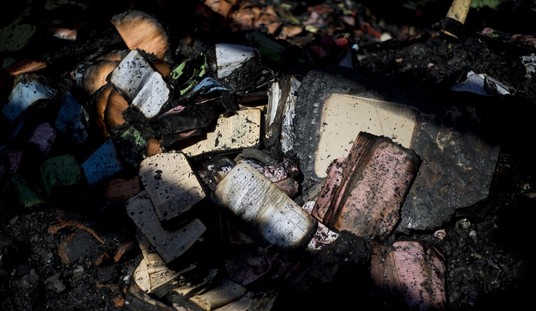On Friday morning, I was working on an article about Pakistani conspiracy theories — how popular they are becoming and how dangerous they are — when news came over the wire of yet another massacre at a Pakistani mosque. During morning prayers, terrorists in Rawalpindi stormed into a place of worship frequented by military officials. Using machine guns, grenades, and IEDs, they killed at least 37 people — including 17 children.
Killing people while they are praying is a horrific and barbaric act. And yet in Pakistan this is a common, almost monthly occurrence.
Bill Roggio of The Long War Journal has been keeping track of major attacks at mosques, religious events, and Islamic institutions in Pakistan. In the past 24 months, there have been 19 such events, which have resulted in more than 400 dead worshipers and hundreds more wounded.
Here are just a few examples of the death and destruction, all from Roggio’s painstakingly chronicled list:
Oct. 20, 2009: A pair of suicide bombers detonated their vests at Islamabad’s International Islamic University, killing five.
June 5, 2009: A suicide bomber killed 49 worshipers in an attack on a mosque in a remote village in Dir.
March 27, 2009: A Taliban suicide bomber killed more than 70 worshipers and wounded more than 125 in an attack at a mosque in the Khyber tribal agency.
Sept. 10, 2008: The Taliban attacked a mosque filled with Ramadan worshipers in the district of Dir in northwestern Pakistan. More than 25 worshipers were killed and more than 50 were wounded.
Aug. 19, 2008: A suicide bomber killed 29 Shia mourners and wounded 35 after detonating in the emergency ward of a hospital. Most of those killed were family members visiting the body of a man murdered by the Taliban in a bazaar earlier that day.
The emerging details of the newest mosque massacre, coupled with equally bloody details from the 18 previous attacks, make the original thesis of my article — how average Pakistani civilians are becoming boondoggled by conspiracy theory thinking — all the more troublesome.
Last week, Pakistani journalist and best-selling author Ahmed Rashid wrote a column for the BBC in which he detailed how Pakistan’s legitimate problems — like the fact that suicide bombings are nearly a daily occurrence — are being overshadowed by conspiracy theories. Almost all of these theories involve the idea that the U.S. and India are engaged in a global conspiracy to destroy Pakistan. That we are the ones responsible for the violence and unrest in Pakistan, not Pakistan. Rashid explains that the single most popular conspiracy theory is that local suicide bombers are actually American “stooges” planted in cities to create dissent among Pakistanis.
Rashid writes:
Recently, [on a talk show] one senior retired army officer claimed that Hakimullah Mehsud — the leader of the Pakistani Taliban which is fighting the army in South Waziristan and has killed hundreds in daily suicide bombings in the past five weeks — had been whisked to safety in a U.S. helicopter to the American-run Bagram airbase in Afghanistan.
Rashid says these kinds of theories are getting serious play on local talk shows. That they are the most popular shows on TV and the ones bringing in the most revenue for advertisers, which in Rashid’s opinion (he lives in Lahore) makes them all the more likely to continue being broadcast. “Nobody discusses the failure of the education system that is now turning out hundreds of suicide bombers, rather than doctors and engineers,” Rashid writes. As a result, confused, demoralized, and angry Pakistanis are becoming more confused, more demoralized, and more angry.
Rashid is not the only one observing Pakistan’s decent into mislaid blame. In May 2009, NBC News aired David Gregory’s interview with Pakistani President Asif Ali Zardari in which Mr. Zardari said that “we knew” that Osama bin Laden was “your operator” in the 1980s. He also said that he believed Osama bin Laden was working on behalf of the U.S. government to destabilize Pakistan and to “overthrow the first woman elected in an Islamic country.” Zadari claimed to have gotten that information from his late wife, Benazir Bhutto, who was the prime minister of Pakistan at the time.
But perhaps the most outrageous allegation came just last month, from Pakistan’s Taliban themselves. In response to a series of suicide attacks, including one at the Islamic University in Islamabad which killed five students and another in a Peshawar market that killed more than 100 civilians, Tehrik-i-Taliban spokesman Azam Tariq told Al Jazeera that Blackwater was to blame and that the U.S. defense contractor has been working in a joint operation with Pakistan’s intelligence agency, the ISI, to demonize the Taliban.
“I want to tell the people in Pakistan and the Muslim nation that the Tehrik-i-Taliban are not responsible for the bombings, but Blackwater and Pakistan’s spy agency are behind them,” Azam Tariq declared.
In this newest mosque massacre, would Blackwater be blamed?
The day after the blast, the Tehrik-i-Taliban emailed CNN to let them know they were behind the carnage. “We reconfirmed it, that the TTP has done it, and will do more which are already planned. … We once again mention that we are not against the innocent people and the state of Pakistan but we against those officers and ministers who are American by hearts and minds and Pakistani just by faces,” the email message said.









Join the conversation as a VIP Member